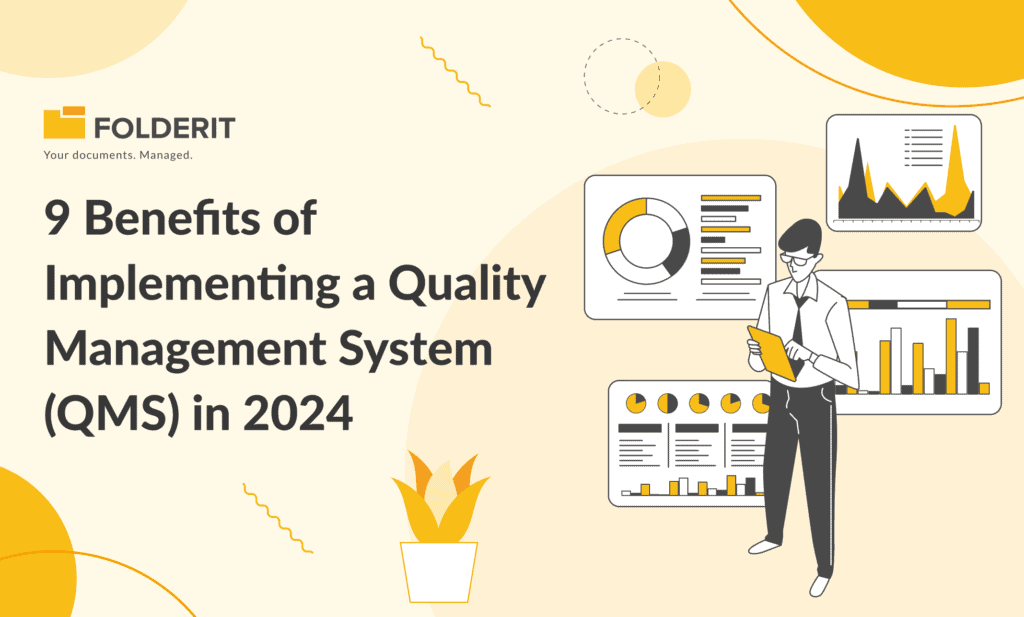The implementation of a Quality Management System (QMS) stands as a cornerstone for organizations striving for excellence. A QMS is not merely a set of protocols for quality assurance; it is an integrative framework designed to enhance every aspect of an organization's operations. As businesses navigate the complexities of globalization and technological innovation, a robust QMS provides the structure and processes needed to achieve and maintain high standards of quality, efficiency, and customer satisfaction. Here are eight pivotal benefits of implementing a QMS in 2024:
1. Enhanced Product and Service Quality
The core concept of a QMS is its unwavering focus on elevating the quality of products and services. By embedding standardized processes and rigorous quality controls, a QMS ensures that every output consistently meets, if not exceeds, customer expectations and industry standards. This level of consistency is crucial for building a strong brand reputation and fostering customer loyalty. Moreover, the systematic approach to quality management facilitates the early detection and resolution of potential issues, minimizing the risk of defects and errors that could tarnish an organization's reputation.
2. Regulatory Compliance and Risk Management
A QMS provides an essential framework for ensuring compliance. By aligning organizational processes with current regulations, a QMS safeguards against legal and financial repercussions and instills stakeholders' confidence regarding the organization's commitment to ethical practices. Furthermore, the proactive risk management capabilities of a QMS enable organizations to identify and mitigate potential risks before they escalate, ensuring business continuity and safeguarding against unforeseen challenges.
3. Increased Efficiency and Cost Reduction
Efficiency and cost-effectiveness are paramount in maintaining a competitive edge. A QMS streamlines operations by identifying redundancies and optimizing workflows, thereby enhancing productivity and reducing lead times. This operational efficiency translates into significant cost savings, as resources are allocated more effectively, and waste is minimized. Additionally, the continuous improvement ethos of a QMS encourages ongoing optimization of processes, further driving down costs and enhancing operational agility.
4. Customer Satisfaction and Loyalty
At the heart of a successful business is a satisfied customer base. A QMS directly contributes to customer satisfaction by ensuring that products and services consistently meet customer needs and expectations. This reliability fosters trust and loyalty, which are critical for repeat business and positive word-of-mouth referrals. Moreover, a QMS includes mechanisms for capturing and analyzing customer feedback, providing valuable insights that can be used to further refine offerings and address customer concerns proactively.
5. Data-Driven Decision Making
The ability to make informed decisions based on accurate data is invaluable. A QMS integrates data collection and analysis into the fabric of an organization’s processes, providing leaders with actionable insights. This data-driven approach enables organizations to identify trends, anticipate market changes, and make strategic decisions that align with long-term objectives. By leveraging data, businesses can optimize their operations, tailor their offerings to meet customer needs more effectively, and allocate resources more efficiently.
6. Employee Engagement and Empowerment
A QMS inherently values the role of employees in driving quality and efficiency. By involving employees in the development and implementation of quality processes, organizations can foster a sense of ownership and accountability. This engagement is crucial for motivating employees to contribute their best work and for encouraging innovation. Furthermore, a QMS provides clear guidelines and expectations, along with the tools and training employees need to meet these expectations, thereby empowering them to excel in their roles.
7. Scalability and Flexibility
As businesses grow and evolve, the need for scalable and flexible systems becomes increasingly critical. A QMS is designed to grow with your organization, providing a structured yet adaptable framework that can accommodate changes in size, scope, and operations. Whether expanding into new markets, introducing new products or services, or adapting to technological advancements, a QMS ensures that quality remains a constant priority. This scalability ensures that businesses can pursue growth opportunities without compromising on the standards that define their brand.
8. Competitive Advantage and Market Position
In a competitive marketplace, differentiation is key to attracting and retaining customers. Implementing a QMS can provide a significant competitive advantage by signaling to customers, suppliers, and competitors that your organization is committed to quality. This commitment can enhance your market position, making your offerings more attractive to quality-conscious consumers and business partners. Additionally, a QMS can open doors to new business opportunities, particularly with clients and industries where adherence to strict quality standards is a prerequisite.
Conclusion
The implementation of a Quality Management System in 2024 represents a strategic investment in the future of any organization. Beyond the immediate benefits of improved quality, efficiency, and customer satisfaction, a QMS lays the foundation for sustainable growth, innovation, and competitive differentiation.
By adopting a QMS, businesses not only commit to excellence in their current operations but also demonstrate foresight and adaptability in preparing for the challenges and opportunities of the digital age. As we move forward, the principles of quality management will continue to be a guiding light for organizations seeking to navigate the complexities of the global marketplace, ensuring that they remain resilient, responsive, and relentless in their pursuit of excellence.



